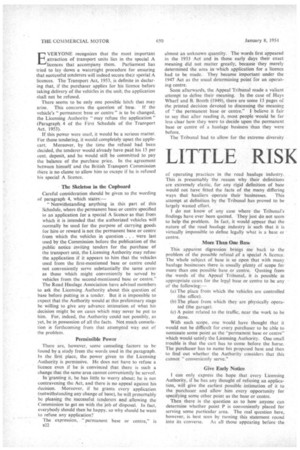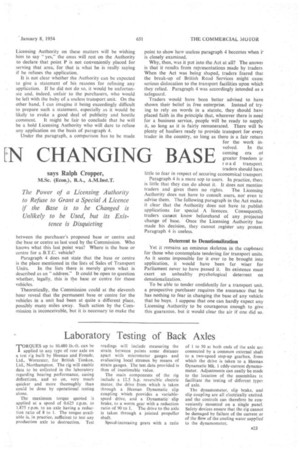LITTLE RISK [N CHANGING BASE
Page 56

Page 57

If you've noticed an error in this article please click here to report it so we can fix it.
EVERYONE recognizes that the most important attraction of transport units lies in the special A licences that accompany them. Parliament has tried to lay down a watertight procedure for ensuring that successful tenderers will indeed secure their special A licences. The Transport Act, 1953, is definite in declaring that, if the purchaser applies for his licence before taking delivery of the vehicles in the unit; the application shall not be refused.
There seems to be only one possible hitch that may arise. This concerns the question of base. If the vehicle's "permanent base or centre" is to be changed, the Licensing Authority "may refuse the application" (Paragraph 4 of the First Schedule of the Transport Act, 1953).
If this power were used, it would be a serious matter. For those tendering, it would completely upset the applecart. Moreover, by the time the refusal had been decided, the tenderer would already have paid his 15 per cent. deposit, and he would still be committed to pay the balance of the purchase price. In the, agreement between himself and the British Transport Commission tliere is no clause to allow him to escape if he is refused his special A licence.
The Skeleton in the Cupboard
Careful consideration should be given to the wording of paragraph 4, which states:— " Notwithstanding anything in this part of this Schedule, where the permanent base or centre specified in an application for a special A licence as that from which it is intended that the authorized vehicles will normally be used for the purpose of carrying goods for hire or reward is not the permanent base or centre from which the vehicles in question . . . were last used by the Commission before the publication of the public notice inviting tenders for the purchase of the transport unit, the Licensing Authority may refuse the application if it appears to him that the vehicles used from the first-mentioned base or centre could not conveniently serve substantially the same areas as those which might conveniently be served by vehicles from the second-mentioned base or centre." The Road Haulage Association have advised members to ask the Licensing Authority about this question of
base before putting in a tender. But it is impossible to.
expect that the Authority would at this preliminary stage be willing to give any advance intimation of what his decision might be on cases which may never be put to him. For, indeed, the Authority could not possibly, as yet, be in possession of all the facts. Not much consola tion is forthcoming from that attempted way out of the problem.
Permissibk Power
There are, however, some consoling factors to be found by a study from the words used in the paragraph. In the first place, the power given to the Licensing Authority is permissive. He does not have to refuse a licence even if he is convinced that there is such a change that the same area cannot conveniently be served.
In 'granting it, he has little to worry about; he is not contravening the Act, and there is no appeal against his decision. Moreover, if he grants every application (notwithstanding any change of base), he will presumably be pleasing the Successful tenderers and allowing the Commission to get on with the job of disposal. In fact, everybody should then be happy, so why should he want to refuse any application?
The. expression, " permanent base or centre," is B22 almost an unknown quantity. The words first appeared in the 1933 Act and in those -early days their exact meaning did not matter greatly, because they merely determined the area in. which application for a licence had to be made.. They became important under the 1947 Act as the usual determining point for an operating centre.
Soon afterwards, the Appeal Tribunal made a valiant attempt to define their meaning. In the case of Hays Wharf and B. Booth (1949), there are some 13 pages of the printed decision devoted to discussing the meaning of the permanent base or centre." I believe it fair • to say that after reading it, most people would be far less clear how they were to decide upon the permanent base or centre of a haulage business than they were before.
The Tribunal had to allow for the extreme diversity of operating practices in the road haulage industry. This is presumably the reason. why their definitions are extremely elastic, for any rigid definition of base would not have fitted the facts of the many differing ways that hauliers operate their businesses. This attempt at definition by the Tribunal has proved to be largely wasted effort.
I do not know of any case where the Tribunal's findings have ever been quoted. They just do not seem to help the problem. In fact, it would appear that the nature of the road haulage industry is such that it is virtually impossible to define legally what is a base or centre.
More Than One Base This apparent digression brings me back to the problem of the possible refusal of a special A licence. The whole subject of base is so open that with many haulage businesses there is usually plenty of scope for more than one possible base or centre. Quoting from the words of the Appeal Tribunal, it is possible in appropriate cases for the legal base or centre to be any of the following:—
(a) The place from which the vehicles are controlled (the office).
(b) The place from which they are physically operated (the garage).
(e) A point related to the traffic, near the work to be done.
With such scope, one would have thought that it would not be difficult for every purchaser to be able to nominate some point as the "permanent base or centre" which would satisfy the Licensing Authority. One small trouble is that the cart has to come before the horse. The purchaser has to name his proposed base and then to find out whether the Authority considers that this cannot " conveniently serve."
Give Early Notice
can only express the hope that every Licensing Authority, if he has any thought of refusing an application, will give the earliest possible -intimation of it to the purchaser and allow him every opportunity for specifying some other point as the base or centre.
Then there is the question as to how anyone can determine whether point P is conveniently placed for serving some particular area. The real question here, however, is -best seen by turning this statement round into its converse. As all those appearing before the Licensing Authority on these matters will be wishing him to say "yes," the onus will rest on the Authority to declare that point P is not conveniently placed for serving that area, for that is what he is really saying if he refuses the application.
It is not clear whether the Authority can be expected to give a statement of his reasons for refusing any application. If he did not do so, it would be unfortunate and, indeed, unfair to the purchasers, who would be left with the baby of a useless transport unit On the other hand, I can imagine it being exceedingly difficult to prepare such a statement, especially as it would be likely to evoke a good deal of publicity and hostile comment. It might be fair to conclude that he will be a bold Licensing Authority who will dare to refuse any application on the basis of paragraph 4.
Under the paragraph, a comparison has to be made between the purchaser's proposed base or centre and the base or centre as last used by the Commission. Who knows what this last point was? Where is the base or centre for a .B.T.C. vehicle?
Paragraph 4 does not state that the base or centre is the place mentioned in the lists of Sales of Transport
Units. In the lists there is merely given what is described as an "address." It could be open to question whether, legally, this is the base or centre for those vehicles,
Theoretically, the Commission could at the eleventh hour reveal that the permanent base or centre for the vehicles in a unit had been at quite a different place, possibly many miles away. Such action by the Commission is inconceivable, but it is necessary to make the point to show how useless paragraph 4 becomes when it is closely examined.
Why, then, was it put into the Act at all? The answei is that it results from representations made by traders. When the Act was being shaped, traders feared that the break-up of British Road Services might cause serious dislocation to the transport facilities upon which they relied. Paragraph 4 was accordingly intended as a safeguard.
Traders would have been better advised to have shown their belief in free enterprise. Instead of try. ing to rely on words in a statute, they should have placed faith in the principle that, wherever there is need for a business service, people will be ready to supply it, so long as it is fairly remunerated. There will he plenty of hauliers ready to provide transport for every trader in the country, so long as there is a fair return for the work involved. In the coming era of greater freedom in road transport, traders should have little to fear in respect of securing economical transport.
Paragraph 4 is a mere sop to users. In practice, there is little that they can do about it. It does not mention traders and gives them no rights. The Licensing Authority does not have to consult users, nor even tc advise them. The following paragraph in the Act maket, it clear that the Authority does not have to ,publish applications for special A licences. Consequently traders canRot know beforehand of any, projected change of base. Once the Licensing Authority has made his decision, they cannot register any protest. Paragraph 4 is useless.
Deterrent to Denationalization
Yet it remains an ominous skeleton in the cupboard for those who contemplate tendering for transport units. As it seems impossible for it ever to be brought into application, it would have •been far wiser for Parliament never to have passed it. Its existence must exert an unhealthy psychological deterrent on denationalization.
To be able to tender confidently for a transport unit, a prospective purchaser requires the assurance that he has nothing to fear in changing the base of any vehicle that he buys. I suppose that one can hardly expect any Licensing Authority to be courageous enough to give this guarantee, but it would clear the air if one did so.




































































































